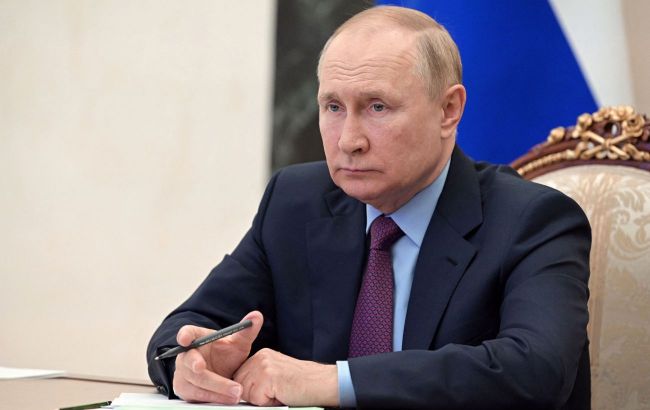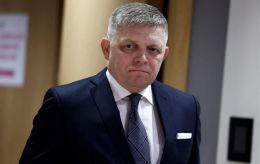War critical period and Russia's new goals: Intelligence reveals Putin's plans
 Russia's dictator, Vladimir Putin (Photo: Getty Images)
Russia's dictator, Vladimir Putin (Photo: Getty Images)
The full-scale war of the Russian Federation against Ukraine has entered a "critical period." However, dictator Vladimir Putin still believes that there is no turning back, and he is ready to continue aggression for a long time. Moreover, the Kremlin has plans for other countries, stated in the column of the head of the Foreign Intelligence Service of Ukraine, Oleksandr Lytvynenko, for Interfax-Ukraine.
Lytvynenko notes that the 21-month war of Russia against Ukraine has entered a critical period. Therefore, much depends today on carefully assessing the adversary's intentions. In the column, he describes how the Kremlin currently perceives this war.
"A triumphant victory" or "devastating defeat"
Russian dictator Vladimir Putin believes that by failing to defeat Ukraine in a three-day large-scale war, the Kremlin has reached a point of no return in relations with the West. For him, there is no turning back; Putin can only either "triumphantly win" or "devastatingly defeat."
The Kremlin believes that bringing back Ukraine and the rest of the "historical Russian lands" and restoring the empire can only happen within the framework of a global redistribution of the world. According to his calculations, such a process may take 10-15 years, accompanied by conflicts of various scales and intensities, possibly involving nuclear weapons.
At the same time, the war against Ukraine is currently perceived by the Kremlin as an important but not the only front for Russia, which is essentially waging a global war against the United States and the West as a whole.
Four tasks of Putin
Given the above approach, the Kremlin is currently considering four tasks:
- Ensure internal stability.
- Form an alternative coalition of states to the West.
- Prepare for future aggression against other countries.
- Stoke conflicts in the Middle East, Africa, and the Balkans.
First Task
To achieve the first task, the Kremlin has "cleared" the political field of opponents and currently ensures economic stability and manageability of socio-political processes.
Russia is also preparing to reach military production volumes by 2026, capable of supporting large-scale, high-intensity combat operations, and by 2028, to restore its military capabilities before the extensive Ukraine invasion in 2022.
The Russian budget for 2024-2026 is specifically tailored for this purpose.
Second
In Moscow, there is a dream of forming an alternative Western coalition of states, the so-called "coalition of the majority." This format, "Global South+," aims to promote alternative Western models (political, economic, financial, humanitarian, values, etc.).
Russia's goal in building a coalition of the majority is to "normalize the West," transforming it into another region (Euro-Atlantic) with the prospect of further integrating Western countries into its regions (North America, Europe, East Asia) and the U.S. into just another leading global country.
To achieve this, the aggressor needs, including by strengthening nuclear blackmail, to break the West's will for confrontation, convince Western elites that they will "unquestionably lose," and they should "peacefully retreat."
The key role here will be played by strengthening the military power of Russia, China, and other countries in the coalition of the majority. The outcome of the war in Russia against Ukraine also has global significance.
Third
Another task for Putin is preparing for future aggression by Russia against other countries. Currently, the priority is Moldova and the Baltic countries: Lithuania, Latvia, Estonia, and the entire western part of the former USSR.
The Kremlin has already started such preparation under the pretext of "violations of the rights of Russian speakers" (primarily Latvia and Estonia).
After the expulsion of Russian spy diplomats, Russians actively infiltrated European countries, especially in the South, with their agents, creating businesses, NGOs, and more. There are signs of infrastructure preparation for subversive activities on a large scale.
Fourth
Stoking conflicts in the Middle East, Africa, and the Balkans is also a task of the Kremlin dictator.
Moreover, the dismissal of the former leader of the PMC Wagner, Yevgeny Prigozhin, does not mean that the Kremlin has abandoned the Prigozhin "modus operandi" on the continent. Currently, in Russia, they are forming an expeditionary corps involving not only the remnants of Wagner but also the Main Intelligence Directorate (GRU), the Foreign Intelligence Service (SVR) of the Russian Federation, and the Federal Security Service (FSB).
Russia also seeks to take advantage of the weakened positions of the West, especially France, in the Sahel and Africa in general. This concerns natural resources, attempts to limit European access to uranium, oil, and gas, and eliminate alternatives to Russian sources of supply.
Putin's goals in Ukraine
The readiness of the enemy to fight for a long time
The goals of the Kremlin's head in the war remain unchanged. He wants to capture as much Ukrainian territory as possible because, for Russians, it is about the "return of historically Russian lands."
The war has entered a stage of attrition, and there is increasing evidence that the Kremlin is prepared to conduct a prolonged war. Russia is incorporating the factor of the so-called SMO(Special military operation) into the plans for army recruitment for 2024-2025 and believes it still has enough resources for aggression. At the same time, Moscow is convinced that Ukraine's internal resources are allegedly approaching complete exhaustion.
One of the keys is internal destabilization in Ukraine.
The Kremlin has also decided to change its strategy, where the key to victory is internal destabilization in Ukraine. The enemy wants to focus on three tasks:
- Pressure along the entire front line to capture specific, politically, and media-important points, including Avdiivka.
- Destruction of critical infrastructure in winter (power plants, oil refineries, transport hubs) to reduce the quality of life.
- Undermining social unity by fueling ambitions and provoking the military ("only they can restore order"), and opposition political forces ("only they are worthy of governing Ukraine").
In this matter, Russians don't care who comes to power after the current leadership. They believe that whoever it is will not be able to control the situation, and Ukraine will descend into chaos. Ultimately, the Kremlin is tuned to the West suspending aid and approaching Russia with proposals for urgent negotiations and a ceasefire.
Ukrainian President Volodymyr Zelenskyy recently stated that Russia wants to remove him from office by the end of 2023, for which it has concocted a destabilization plan called Maidan-3.
Earlier, the Commander-in-Chief of the Armed Forces of Ukraine, Valerii Zaluzhnyi, published an article in The Economist, stating that Ukraine faces positional warfare and describing ways to resolve the situation.
In contrast, President Volodymyr Zelenskyy stated that Ukraine is ready for a prolonged war but with the condition of minimizing casualties.
Recently, Ukraine has increasingly been predicted a protracted war that may continue into 2024. Read about how the situation on the front may develop in the material by RBC-Ukraine.

